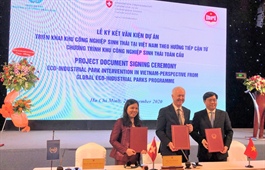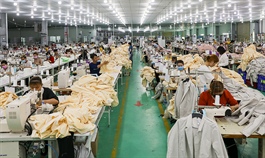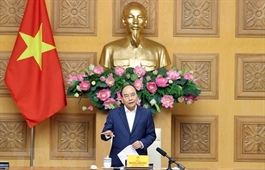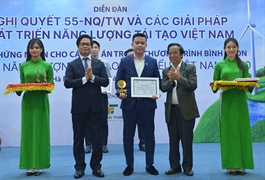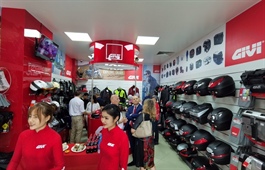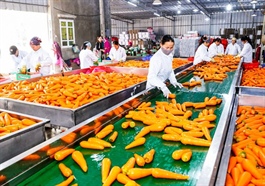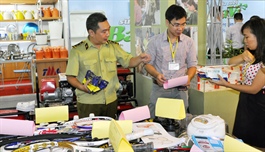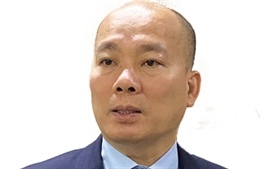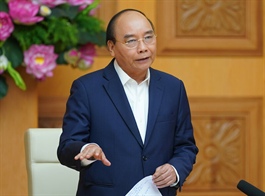Network promising smarter logistics
Network promising smarter logistics
With the recent forming of the ASEAN Smart Logistics Network and the docking of a large container ship on Vietnam’s coast, the country is introducing a new era of connectivity with global markets – and with that, foreign investors are eager to increase involvement in local logistics services and contribute to the region’s connectivity.
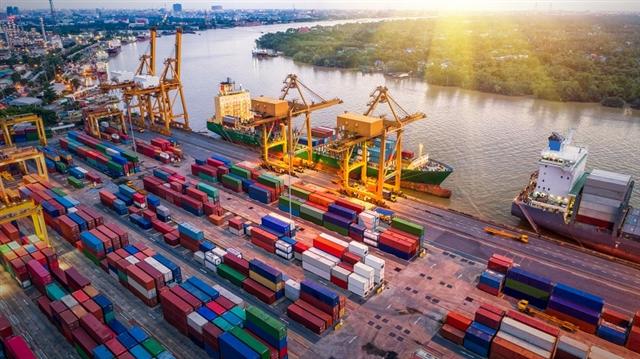
Network promising smarter logistics - illustration photo/ Shutterstock
|
Singaporean logistics giant YCH Group this month launched the ASEAN Smart Logistics Network (ASLN) with Vietnamese conglomerate T&T Group. The network aims to achieve a seamlessly and comprehensively connected ASEAN that will promote competitiveness and inclusiveness and enable the region to become one formidable economic bloc.
As such, both corporations will team up to lead the first project of the ASLN, the Vinh Phuc ICD Logistics Centre (SuperPort). Located near the capital of Hanoi, SuperPort will be the first of its kind – a multi-modal logistics hub integrating a dry port and an advanced supply chain operation centre that focuses on connectivity, sustainability, scalability, and agility.
The project will demonstrate the advantages of multi-modal transportation through its road, rail, air, and sea connections, linking China’s Yunnan province and Kunming city to Hanoi and eventually Haiphong international port to the east of the capital.
With its strategic location in the northern province of Vinh Phuc, which is within reach of 20 industrial parks, the SuperPort will act as a supply hub for the region’s manufacturing operations, which have projected to grow exponentially as many foreign enterprises’ activities shift towards Vietnam.
Dr. Robert Yap, executive chairman of YCH Group, said, “Through our hard-earned experience in driving connectivity in the region, YCH has risen over the last few decades to become one of the leading integrated end-to-end supply chain management and logistics partners – with this latest effort looking to further strengthen China-ASEAN connectivity.”
Yap added that it is important for YCH to grow together and share best practices with partners. “We look to drive more initiatives for ASEAN enterprises and its community as we move together dynamically, enhancing our competitiveness towards inclusive economic growth for all,” he emphasised.
Tobias Gruemmer, head of Warehouse & Distribution and Depot, Maersk Vietnam, Cambodia and Myanmar, told VIR that a sound logistics network is the key for success in attracting investment. “The Vietnamese government has been making great efforts to attract foreign investment and improve connectivity to support business as well as trade in the area. We saw the infrastructure has developed quite significantly in past decades,” Gruemmer said.
As Vietnam has managed the global health crisis well so far and demonstrated its logistic capabilities, this successful crisis management has helped the country focus on keeping supply chains moving globally, which also showcased the development of the ASEAN logistics network during the past few years, according to Gruemmer.
“The Master Plan on ASEAN Connectivity 2025 and the new ASLN will help promote logistical chains in the region and assist the bloc’s economic integration efforts and initiatives. We always welcome initiatives that promote free trade or remove trade barriers,” Gruemmer said.
Last December, Maersk opened a new logistics centre in north Vietnam, located around 20km from Hanoi. The 11,000-square-metre facility provides customers with end-to-end warehousing and distribution solutions. Approximately 40 per cent of the warehouse is occupied by Turkish home appliance company, while the remaining capacity is filled by customers from various segments, including automotives and fast-moving consumer goods.
At the end of last month, the Margrethe Maersk, a Triple-E container ship and the largest vessel to ever call at Vietnam’s ports, docked at Cai Mep International Terminal and marked an important milestone showing that Vietnam’s deep-sea terminals are capable of receiving ships of this size.
“Vietnam certainly is a beneficiary of the growing supply chain shifts from China to Southeast Asia,” Gruemmer said. ”We also believe that the newly signed Regional Comprehensive Economic Partnership (RCEP) will be important drivers to Vietnam’s GDP growth in the coming years, despite the current impact from COVID-19. The country may be the most liberal one in ASEAN, having signed the highest number of FTAs and offering stability as well as a sound legal framework.”







